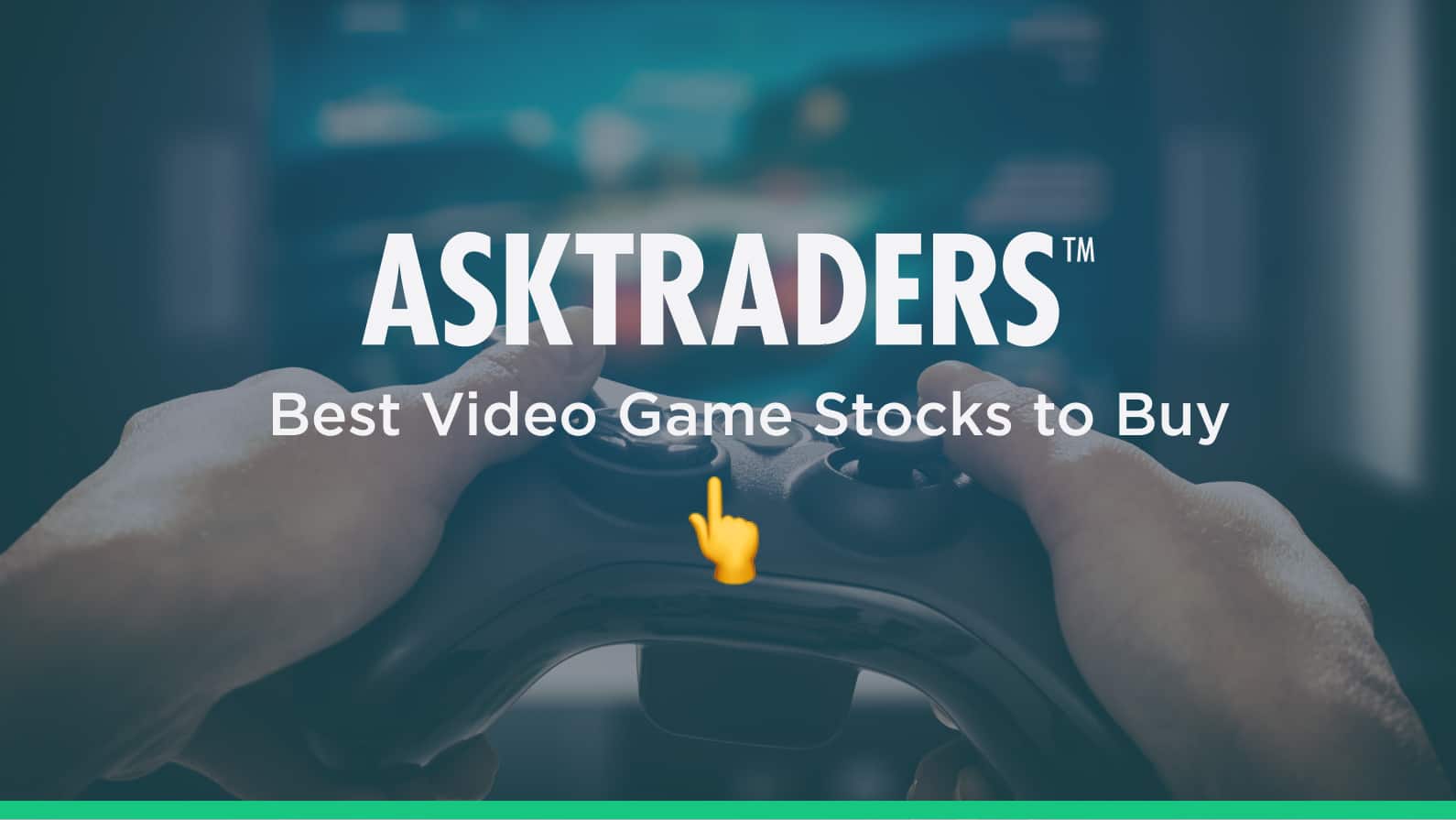The video game industry is dynamic, fast-moving and huge. According to Statista predict that the market for 2024 will already be $282.3 billion, with an annual rate of growth for the sector of 8.76% through the next 3 years. In 2027, video games will account for 10.9% of global spending in the entertainment and media sector, up from 6.1% in 2017.
Whilst the whole sector is experiencing growth year over year, there are some interesting segments of the video game industry that are expected to outpace others in the years to come. Let's take a look at some of these trends, and some of the stocks that are best equipped to capitalise from these in the coming years.
Above-market growth makes any sector attractive to investors, but picking the right video game stock to buy now can lead to even more impressive returns. By applying fundamental and technical analysis, we’ve identified the best gaming stocks to buy now, all of which have a plausible reason to justify a place in a well-diversified portfolio.

Table of contents
Why Invest in Video Game Stocks?
The video game industry is booming and more importantly tipped to continue doing so. The expansion is expected to make the sector worth $363.20bn by 2027.
The sector is also changing in nature and in ways that look set to expand its appeal. Social networks, smartphones and tablets have expanded its reach beyond traditional video game consoles. At the same time, it’s an industry with demographics on its side due to new generations of young gamers forming a pipeline of new customers.
Gauging the potential of some of the ground-breaking developments is made more difficult due to the degree of acceptance of innovative technologies being hard to predict. The counterargument, which suggests that investing can be justified, is backed up by the impressive expansion of virtual gaming tournaments and immersive gaming (virtual reality), which points towards a strong appetite for new features.
Those innovative new products and themes are what keep users spending more to ensure that they keep up with the latest trend. Established esports tournaments are simultaneously continuing to develop market share, with the 2022 League of Legends World Championship smashing viewership records and recording more than 5 million viewers.
The Game Awards 2022 ceremony, which picked out winners in a range of categories, offers a good yardstick to the health of the sector. The ‘Oscars’ of gaming was at one point being watched by 3.42 million viewers and cemented the industry’s move into the mainstream by being broadcast on Steam TV for the first time.

Best Gaming Stocks to Buy Right Now
Gaming giants Electronic Arts, Microsoft, and Take Two Interactive are all strong choices to consider over the coming years for those optimistic about the sector. These three companies all deliver video games exposure, to slightly differing levels. EA and TTWO are pure video game plays, whereas MSFT has a more diverse business that covers a whole range of tech areas, including multiple revenue streams now derived from gaming.
Each of the firms as you can see from the data above have strong support from the analyst community, and remain firm favourites for those looking for solid video game shares to invest in. You can toggle the chart shown to get a glimpse into the longer term performance of each by clicking on the relevant company in the table.
Electronic Arts (NASDAQ: EA)
Founded in 1992, Electronic Arts is one of the prime candidates for a shortlist of best gaming stocks to buy. With a strong position in the sports sub-genre of the gaming sector, its flagship franchises include the ever-popular FIFA and Madden NFL games.
EA is the second-largest gaming firm in the world in terms of revenue and has used that cash flow to develop market share in new areas. The Apex Legends and Battlefield games demonstrate the firm’s appetite for developing its scope, and the purchase of Glu Mobile in 2021 has given the company a foothold in mobile gaming.
With gaming rights stretching from Star Wars to football, the firm is as close to a Blue Chip investment as is possible in the gaming sector. It currently offers a dividend and has a P/E ratio which is not cheap compared to traditional industries but offers a blend of growth prospects and solidity.
YOUR CAPITAL IS AT RISK
Take-Two Interactive Software Inc (NASDAQ: TTWO)
Take-Two Interactive Software Inc (NASDAQ:TTWO) is a video game developer with a market-leading range of games. Its wide-ranging portfolio of products is published under the banner of game sites such as Rockstar Games, 2K, Private Division and T2 Mobile Games.
The 2022 merger with mobile-based firm Zynga offers an opportunity for the firm to move into that sector and diversify its operations to reduce exposure to the Grand Theft Auto franchise, which while phenomenally successful has overshadowed some of its other titles.
Operational challenges associated with the Zynga merger and a market-wide move away from tech stocks resulted in the TTWO stock price falling by more than 40% in 2022, but the bad news now looks to be priced in. Once those synergies kick in, the market can be expected to turn its focus to the release of Grand Theft Auto VI, which is expected in 2024.
YOUR CAPITAL IS AT RISK
Microsoft Corp (NYSE: MSFT)
Microsoft’s core business might be based around software and cloud computing, but it is one of the biggest players in the video gaming market. That makes it an ideal proposition for an investor looking to gain exposure to the gaming sector with the option to fall back on different revenue streams.
The firm is behind the Xbox game console; it owns several high-profile gaming studies; and Windows is the default operating system for the industry.
Microsoft owns Minecraft developer Mojang, and Bethesda, which operates the Elder Scrolls franchise. The firm’s commitment to the sector has been confirmed by its acquisition of gaming giant Activision Blizzard for almost $70bn, which would bring titles such as Candy Crush Saga, Call of Duty, and World of Warcraft under the Microsoft banner.
The astounding track record of Microsoft shares means that many investors considering buying the stock treat the question as a matter or ‘when’, not ‘if’. The stock has now touched a $3trillion valuation, and many expect companies like Microsoft to be stalwarts of the industry for extended periods of time. Acquisitions like Activision Blizzard which cost MSFT $68.7 billion, and caused a few antitrust headaches are a clear sign of commitment.
YOUR CAPITAL IS AT RISK
How To Buy Video Game Shares
Buying video game stocks is an easy and straightforward process. First, you will need to have an account with a broker, but if you don’t already, you can check out our reviews of the top-rated stockbrokers here.
Once you have an account, the next thing you will need to do is sign into the platform and search for the stock you want to buy. One important point to note is that if you are adopting a buy-and-hold approach, then buying the shares outright using a share dealing account will help you avoid the financing fees associated with CFDs, which can stack up in the long run.
Once you have found the stock you are looking for, you will need to fill in the details regarding how many shares you want to purchase and then click the ‘Buy’ or ‘Submit’ button.
If you are still not sure of the individual company you are interested in but would like an overview on how to get involved at a market level with an index that contains stocks like Microsoft as a component, we have a detailed guide on how to invest in the S&P 500 that may help.
Things to Know About Video Game Stocks
Growth forecasts for the video game sector are certainly attractive, but investors looking to optimise returns would do well to consider some of the unique features of the market.
Those who are looking to buy video game stocks but aren’t themselves active gamers need to appreciate the importance of new game releases. Some established titles have an evergreen appeal, but the sector is known for new entrants breaking through, and a bad launch or upgrade can scupper a game’s prospects and that company’s share price.
Thanks to the excitement around the subject, industry sites closely monitor the pipeline of new games coming to the market. GamesRadar+ provides a 12-month calendar on new titles and offers an insight from a gamer’s perspective – gauging the immediate response to new releases being best done by reviewing social media.
Supply chain issues can also be an issue for gaming firms. A spike in demand for consoles during the COVID-19 pandemic resulted in a shortage of the semiconductor microchips they require. Due to the short supply of chips, Nintendo produced 20% fewer consoles in Q1 2022, and the scarcity of materials also drove up the price of parts, which ate into profit margins.
Lockdown work restrictions also played a part in creating challenges for gaming firms. Speaking with CNBC, Intel CEO Pat Gelsinger suggested that the chip shortage could be easing: “Every quarter next year we’ll get incrementally better, but they’re not going to have supply-demand balance until 2023.” While an improvement looks likely, recent events highlight the potential risks associated with the sector.
The market is also dominated by the US and China. Those two countries account for 49% of all gaming industry revenues, so gaining an understanding of what is and isn’t working in those markets is crucial for investors looking to make a return on their capital.
A major challenge for investors is factoring in the way that the gaming sector evolves. The industry is still in a growth phase, and while this means that aggregate demand is on the up, there will be losers as well as winners.
The move away from console and PC gaming to mobile devices requires video game companies to keep ahead of trends and be willing to invest accordingly, which is associated with inherent risk.
Handset gaming became the dominant form of play in 2021 when it grew to account for 57% of global video game revenue. Momentum for that sub-sector looks set to continue building, and the rollout of 5G networks will mean that it plays an even more important role in determining the price of gaming stocks.
YOUR CAPITAL IS AT RISK
Final Thoughts
The gaming sector is already larger in value than the movie and sound industries combined, and crucially it is yet to maximise its potential. Whilst we have focused on three big names, investors can pitch their investment to tap into established names, new releases, or relatively untried technologies such as immersive gaming.









